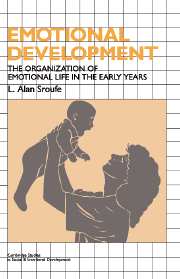Book contents
- Frontmatter
- Contents
- Preface
- Part I The nature of emotional development
- 1 A developmental perspective on emotions
- 2 Conceptual issues underlying the study of emotion
- 3 Emotion and the organization of development
- Part II The unfolding of the emotions
- Part III Emotional development and individual adaptation
- References
- Index
2 - Conceptual issues underlying the study of emotion
Published online by Cambridge University Press: 16 September 2009
- Frontmatter
- Contents
- Preface
- Part I The nature of emotional development
- 1 A developmental perspective on emotions
- 2 Conceptual issues underlying the study of emotion
- 3 Emotion and the organization of development
- Part II The unfolding of the emotions
- Part III Emotional development and individual adaptation
- References
- Index
Summary
Without some version of a motivational principle, emotion makes little sense, in as much as what is important or unimportant to us determines what we define as harmful or beneficial, hence emotional.
Lazarus (1991)The concern in this book is both with emotions as events and with emotional regulation as a core feature of normative and individual development. Theoretical treatments have rarely been this broad. Generally, they emphasize one aspect or the other. Therefore, it will be necessary to draw on insights from a variety of perspectives. There are excellent works on the emergence of the affects (e.g., Izard, 1978, 1990), the instigation of emotion (Frijda, 1988; Lazarus, 1991; Mandler, 1984), and emotional regulation (Fogel, 1993; Schore, 1994; Thompson, 1990).
According to Arnold (1960), a “balanced” theory of emotion differentiates emotional experience from other experience, accounts for the arousal of emotion and bodily change, and specifies the place of emotion in goal-directed action. A “complete” theory also distinguishes emotions from feelings and one emotion from the other, and it specifies neurophysiological mechanisms and the significance of emotion in personality integration. Thus, emotions and emotional life are multifaceted, entailing a consideration of physiological, cognitive, and social factors, and expressive as well as internal components (Schore, 1994).
- Type
- Chapter
- Information
- Emotional DevelopmentThe Organization of Emotional Life in the Early Years, pp. 11 - 37Publisher: Cambridge University PressPrint publication year: 1996

